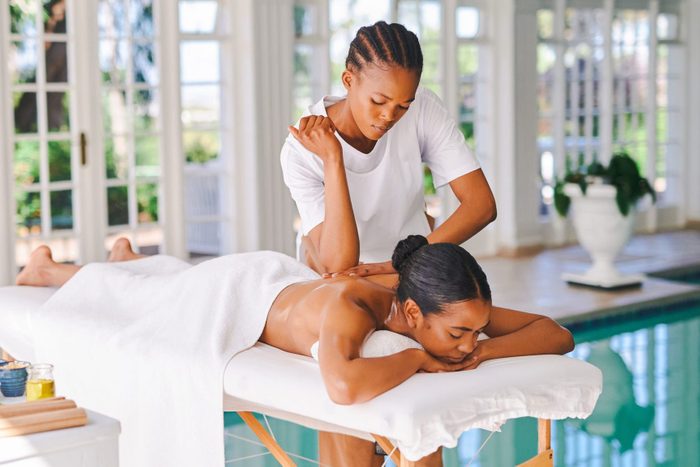
Your masseuse pays attention to more than just your back
Chances are, when you head to a spa for a massage, you start noticing things the minute you walk through the door. Perhaps you detect the calming scent of lavender in the air or realize the whole place is decked out in soothing neutrals. Or maybe there are some more unfortunate things that catch your attention—like dust bunnies on the floor or a massage therapist with a bad case of BO. Good or bad, these little things will affect your experience and may inform how much you tip for your massage. Interestingly, though, you’re not the only one taking stock of things.
Massage therapists are also noticing plenty of things about you too, and it’s a little different than what a hairstylist or nail tech would notice. Whether you frequent luxurious spas or more humble spots, massage therapists are trained to be attuned to their clients, and a good therapist pays close attention so they can provide the best possible service. Curious what they notice? We spoke to massage therapists to find out—here’s what they said.
Get Reader’s Digest’s Read Up newsletter for more etiquette, humor, cleaning, travel, tech and fun facts all week long.
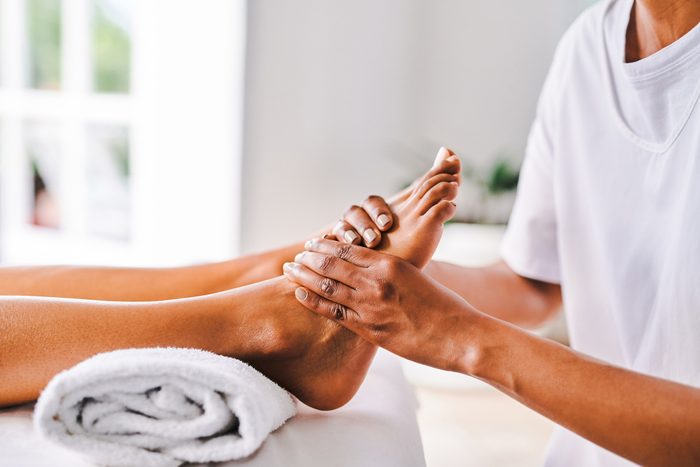
Your overall hygiene
Your massage therapist is about to get up close and personal with you, so if you show up smelling like you just ran a marathon, they notice (and probably cringe a bit). On the flip side, they’ll also know (and appreciate!) if you have showered or freshened up before a massage. “Not only does this contribute to a more enjoyable experience for both the therapist and the client, but having clean skin also sets the stage for a more effective massage because it allows the therapist to apply oils and lotions smoothly,” says Carmen Barcelona, owner of Carmen Barcelona Bodywork and Massage Therapy in Hawaii.
No time to shower right before a massage? No problem. “If you are coming straight from the office, you probably won’t be able to stop home to bathe,” says Erin Copelan, owner of Erin Copelan Massage in Fort Lauderdale, Florida. “[But] showering at some point on the day of your massage is preferable.”
On a similar note: You may want to consider going easy on the perfume. A little spritz will likely be fine, but wearing fragrance may interfere with the calming scents used in a spa—not to mention, it could be overwhelming for your therapist, since you’ll be in a small, enclosed space together.
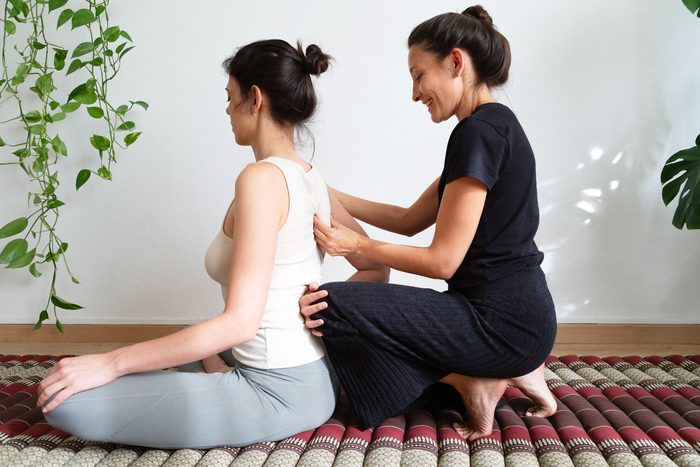
Your posture
Whether you walk into the room like a robot or you’re loose and agile, your massage therapist is paying attention. The same goes for how you sit in the chair in the waiting room. Don’t stress, they’re not judging you—they’re just collecting info on your body language so they can do their job better. They’ll see where you hold your tension, if you have an injury, how stressed you are and your overall mood.
Interestingly, they may even be able to tell what kind of job you do based on these things. “For example, if a person has a profession that requires them to sit for long periods of time in front of a computer, they will often present with a chronic forward head posture,” says Barcelona. “It’s a fascinating aspect of my work to notice how the body can reflect the demands and habits of a person’s daily activities.” These little tells can be helpful because it can give your therapist a clue regarding what parts of your body need special attention.
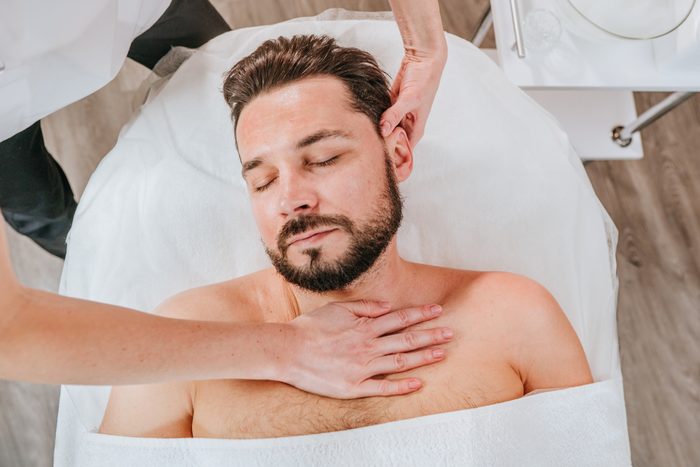
Your breathing pattern
Well before you get on their table, a masseuse will notice whether your breaths are deep or shallow. Yes, we’re talking even before the treatment has officially started. Here’s why: Breathing is important and can reveal whether or not you are holding tension in your body. “Our observation begins as soon as the client enters the space, continues during the assessment and persists while they are on the massage table,” explains Barcelona. “This helps me assess their emotional and physical state, providing insights into their tension levels. Typically, slow and deep breaths indicate relaxation, while shallow or irregular breathing may suggest tension.”
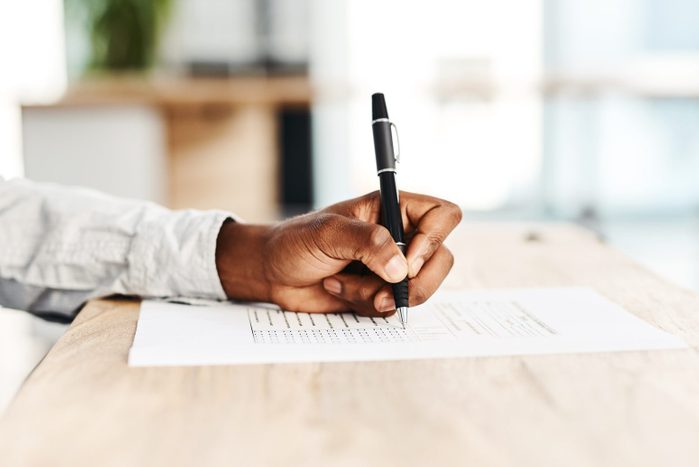
Your level of detail
Many massage therapists ask you to fill out a form before a massage. On it, you’ll generally find questions about preferred pressure, areas of your body that may be aggravating you and any medical issues you have. All this information can help therapists do their job better and let them know exactly what you’re looking for. “By combining my assessment with the client’s feedback,” says Barcelona, “I can customize the massage techniques to precisely target and address areas of tension, ensuring a tailored and effective massage experience.”
So, when filling out this form, be as detailed as possible. Note where you’ve been feeling tight—even if it doesn’t seem like a place a massage can help. For example, maybe your face is feeling tense. Your therapist may have face massage tools to use on you. And always be clear about the level of pressure you like. Not sure about that last part? Write that down so the therapist knows to try different pressures to determine what will be both effective and comfortable.
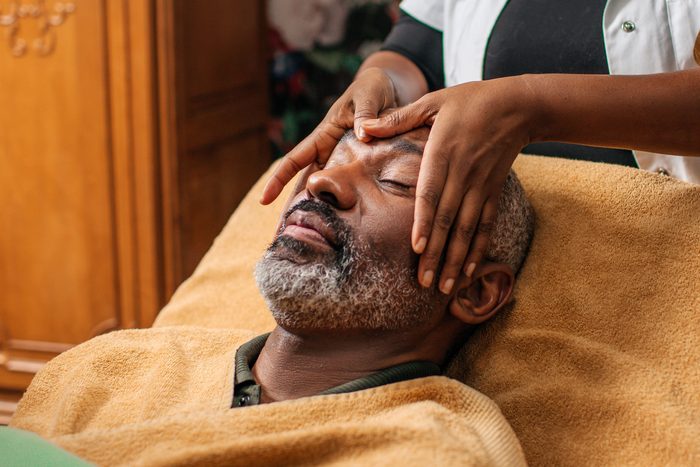
Yelps, squirms and holding your breath
Speaking of pressure, if it is too intense and you start holding your breath or trying not to wiggle against the pain, your therapist will pick up on that. “It’s a clear signal that the deep pressure may be too intense for your body to handle comfortably,” says Barcelona. You may think that deeper is better, even if it hurts. But that’s not necessarily true, says Copelan. “In my practice, I prioritize technique over pressure,” she explains. “An effective massage can be administered and received without beating you up. If a client feels pain, is flinching or yelps from the pressure, it likely means their muscles are on guard in protection mode, and it will be more challenging for the therapist to access deeper layers of tissue.”
Just like it’s a big mistake not to speak up about a haircut you don’t like at the salon, it’s a faux pas not to mention if massage pressure isn’t working for you. This is all to say, if it’s too much, speak up! You can even note where it’s OK to use deep pressure (like your shoulders) and where it may be too much (your lower back, for example).
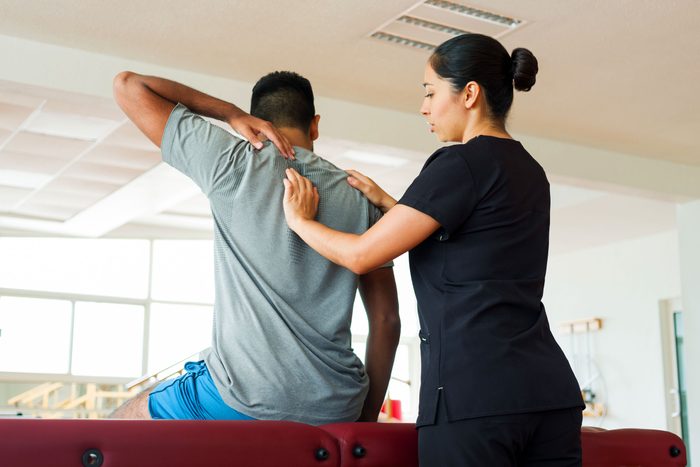
Real-time feedback
Pressure-related feedback isn’t the only kind of feedback that is appreciated during a massage. Rather than waiting till the end to tell your therapist how the experience is, give them an idea of what you think within the first 10 minutes. This will allow them to change tactics or do more of what you like so that you get the best massage possible. Not sure what to say? Tell them if something doesn’t feel good—or if it does, so they know to keep doing that, says Barcelona. Or maybe you want them to use more massage oil or know that the smell of the scented candle burning in the corner is bothering you—these are all valid things to note.
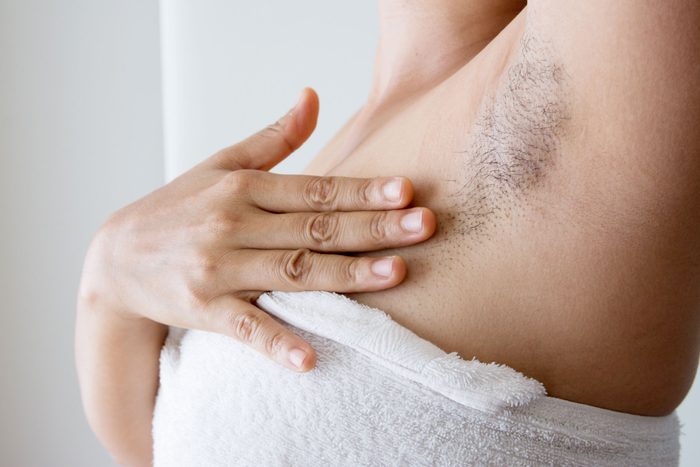
Your body-hair situation
Didn’t get a chance to shave your legs? Are your underarms a little fuzzy? Sure, your masseuse may notice—after all, they are running their hands over your body. But they won’t care. The same goes for things like back acne or callused feet. “I strongly encourage clients to not feel embarrassed about their appearance when coming in for a massage,” says Barcelona. “Body hair, acne, scars and various skin conditions are entirely normal and make no difference in the quality of care and attention you will receive during the massage. Your comfort and well-being are what truly matter.”
That said, if you will feel self-conscious the entire time and it prevents you from being able to relax fully, that’s not ideal either. If this sounds like something that would plague you, consider setting an alert on your phone the night before your massage appointment to remind you to shave or give yourself a quickie pedicure at home.
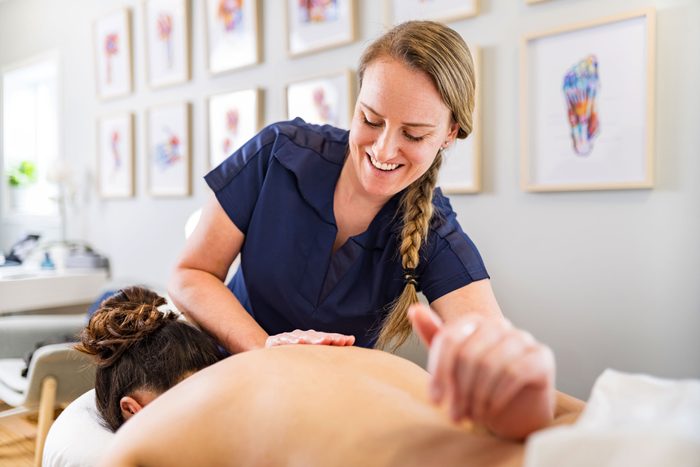
Whether you chitchat or not
A really good masseuse wants to make you feel as comfortable as possible, so they pay close attention to your conversation cues. If you make small talk, they’ll engage. If you are silent, a good therapist will follow your lead and check in only when they need you to move or want to check on you. That said, most pros will prefer not to engage in extensive conversation. “I do attempt to limit my responses,” says Copelan. “My massage is better if 100% of my focus is on the client’s body.”
Another thing to keep in mind is that a spa’s environment mirrors that of a library—it’s quiet. “Sound can travel, and that may disturb other clients,” says Barcelona. If you do want to chat, keep your voice low so as not to bother anyone else.
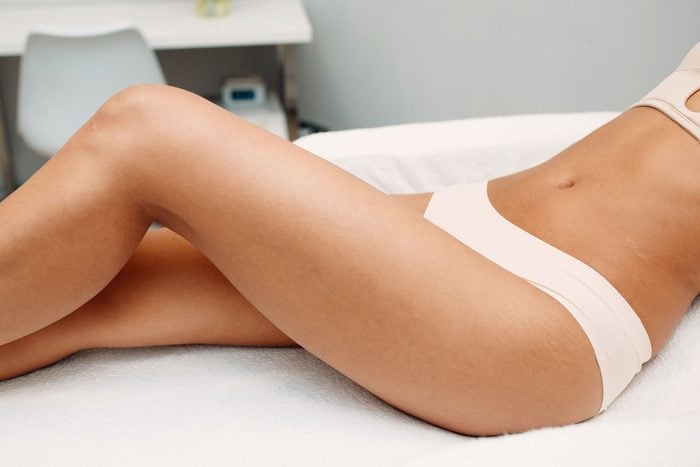
If you’re wearing underwear
To fully strip or not to strip and instead leave your undies on? That is the question. Whatever decision you make, it’s totally fine. But they will notice, because if you’re going commando, they’ll adjust the sheet accordingly. Not sure what to do? “Always ask,” says Copelan. “Some therapists require underwear. I give the client the option and always use proper draping—a technique used to only expose the body part being worked on.”
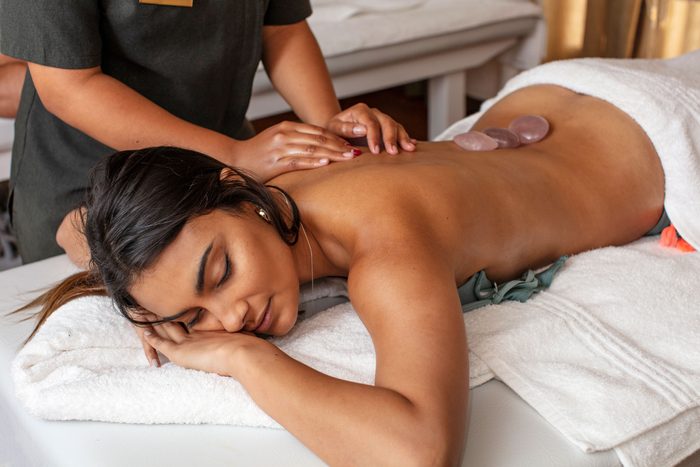
If you fall asleep
You’re laying on a table in a dark room with relaxing music. Who could blame you if you doze off? Certainly not your masseuse, especially if they’re using one of those super calming scalp massagers. Still, of course they notice. “I can typically discern if someone drifts into slumber during a massage,” says Barcelona. “Often, subtle shifts in their breathing pattern signal a transition into a deeper state of relaxation.”
Oh, and falling asleep may even signal to the therapist that they’re doing their job right. “In massage styles like Swedish massage, sleep is often a positive sign, indicating that the therapist is effectively inducing relaxation and comfort,” explains Barcelona. That said, not every style of massage is suitable for sleeping. Sessions that concentrate on more intensive, structural techniques like trigger-point release and rolfing can be more challenging if someone is asleep, says Barcelona. If you have one of these types of massage scheduled, try to go in well rested to avoid the potential for snoozing.
About the experts
- Carmen Barcelona is a licensed massage therapist and the owner of Carmen Barcelona Bodywork and Massage Therapy in Hawaii. She has more than 10 years of experience, and prior to living in Hawaii, she ran a successful massage and bodywork business in Miami.
- Erin Copelan is a licensed massage therapist and the owner of Erin Copelan Massage in Fort Lauderdale, Florida. She has 10-plus years of experience and offers many different types of massage, including deep tissue and craniosacral.
